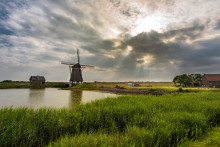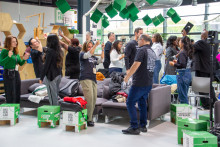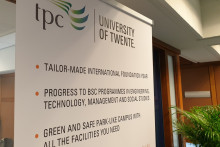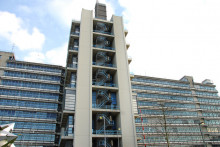The workshop was guided by Candida Snow, who was born in England and has worked in different countries, including Spain, France and now the Netherlands. ‘I’ve been here for 23 years. You would think England and the Netherlands are culturally the same, there’s only a small sea in between. But when you least expect it, you start noticing the big differences,' says Snow.
Being brutally honest
At the beginning of this interactive session, students from 10 different countries were prompted to answer the question ‘What is being Dutch?’ The answers included being brutally honest, and partying hard. Snow projected TV commercials and photographs where Dutch citizens were highly stereotyped and then inquired into where these visions come from. She suggested that as foreigners in a culture, we inevitably compare somebody’s actions with our own, taking our culture as a reference point.
A Cultural Survey
Based on the research of the social psychologist Geert Hofstede, Snow showed how a similar situation, such as having explicit confrontations with colleagues at work or having a boss with a clearly defined field of authority, is perceived strikingly different across countries. Snow showed graphics with the average responses from the Netherlands compared to the average responses of the participants’ countries. Drawing connections to the initial conversation, she suggested that being brutally honest might be a result of being raised to speak up and partying hard might come from valuing a work-life balance.
Originally from Sénegal, the attendant Mohamed Ba recently graduated and decided to join the workshop as he now hopes to get a job in the Netherlands. ‘I think this information is helpful. If I get an interview, I will definitely speak up instead of only sitting and wait.’
Strengthening collaborations
Snow talked from her own experience of adapting to the Dutch culture. With a background in linguistics and cultural theory, she explained to the listeners how to deal with these cultural contrasts and emphasized that the point is not proving that someone’s right or wrong. Instead, noting these differences helps to understand disagreements and strengthen the collaboration within international environments.
‘It can make a real difference. It can take away a lot of judgment and confusion. Cultural contrasts might never go away entirely, but through this work, you can start to recognize them and learn how to deal with them.’
This open workshop is a 2-session sample of the broader training program Connect International Talent offered by the University of Twente in collaboration with Saxion. The final session, which aims to reflect on the previous conversation, will be held the next October 19th at the DesignLab.








